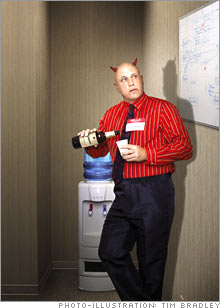Employees from hell: Drunken forklift driverTerrifying tales of wicked workers and tips on how to avoid them.(FSB Magazine) -- You can't fault Clark Glav�'s interviewing process. When hiring a driver for his storage facility business, Glav�, 44, grilled several candidates using a seven-page questionnaire that asked about such topics as job expectations and potential ethical dilemmas. When he pinpointed the best candidate, Glav� checked that person's references, driving record and health record and then asked for a drug test. As an offsite employer - Glav� lived in Richmond; his warehouse was in Raleigh - he had to be careful. His new driver passed all his screens. "The first few months everything was hunky-dory," Glav� says. He remembers working beside Jerry (not his real name) for three weeks, establishing performance expectations. After he had broken in his new worker, Glav� says, he went back home, checking in periodically with phone calls. That's when the first signs of trouble appeared. "He started to get a little cocky," Glav� remembers, "changing his route, not working on Saturday. I started to lean on him a bit, and things got worse." During a site visit, Glav� says, he was surprised to find that Jerry still hadn't created a system for cataloging the used storage areas in the warehouse - a rudimentary step that was part of his job description. "He complained about the volume of work he had, so I said we'd get him some help." (Jerry agrees that he was overwhelmed by the workload.) Glav� placed a want ad in the local newspaper seeking another employee. When nobody answered, Jerry suggested a friend who he claimed had great computer skills. Glav� gave it a shot, thinking, "This could be either really good or really bad." For a few weeks "really good" seemed to be winning out. With Glav� staying in town to oversee their work, the friends appeared to have the office under control. But after Glav� returned home, he says, all hell broke loose. Glav� remembers showing up on a Monday morning for a surprise visit and finding that his office resembled a bachelor pad: "The place was filthy, there were six cases of empty beer cans and bottles in my dumpster, and the warehouse was an absolute mess." Glav� kept a mattress in the back to sleep on when visiting; he says it had obviously seen heavy use and was strewn with women's undergarments. (Jerry says the mess was his co-worker's doing and pleads ignorance about the beer.) Neither employee had established a system for tracking the 140 storage areas in the warehouse, Glav� says, a job Jerry had shifted to his friend. Later that day, Glav� says, he received a phone call from his landlord, alerting him to a problem in the warehouse. Glav� discovered that the wall it shared with an adjacent tenant had been bashed in. "Forty feet of wall, pushed more than a foot back," he says. "To do that, someone had to repeatedly hit it with the forklift. Repeatedly." Both employees said they hadn't hit the wall. But a neighboring tenant told Glav� that when she had come over to complain about the damaged wall, she had found Jerry's friend "staggering drunk." Glav� concluded that they had spent two days drinking beer and driving the forklift around the warehouse. (Jerry says he never drank on the job, and he attributes the damage to his friend. Despite hiring a private investigator and contacting his parents, FSB was unable to get in touch with the co-worker, who has no permanent address or telephone number.) Glav� decided to fire Jerry's friend the next morning, but he never got the chance. The friend didn't show up for work and had disconnected his telephone. Glav� let Jerry stay for another week before firing him - but only so that he could withhold Jerry's last paycheck to cover $850 of personal calls on his work cell phone. "There are three things I should have done differently," Glav� realizes. First, he should have paid attention when Jerry started talking about his marriage problems. "Usually when an employee's personal life goes on the skids, if they already have a tendency to party they're going to start drinking more to escape. Also, I got too comfortable with not doing the spot checks every week or every other week," he says. "I'm an absentee owner; what these guys tell me on the phone can be quite different from what's there. Unless I'm eyeballing them, I can't tell if they're lying to me." Last, Glav� says he made a mistake in basing a hiring decision on an employee's recommendation. "I went for it because I was in a strange town where I didn't know anyone. I wasn't getting responses to my ad, and he was a convenient body that seemed to meet the criteria. I bought it hook, line and sinker." It took Glav� four weeks of hard work to clean up the mess, he says, but he's not bitter. "You roll up your sleeves and make sure everyone is happy. It's all about customer service and delivering a superior product." Today Glav� has a driver he hired using the same interview process, but he pays him a salary rather than hourly wages, which allows his employee to focus on the job instead of racking up overtime. Glav� visits every two weeks to check up. So far, he has no complaints. Are you seeing an increase in problem employees? What types of bad behavior have you seen at your company? How have you managed difficult workers? Let us know what your experiences have been by writing to fsb_mail@timeinc.com. ----------------------------- In defense of bosses from hell |
Sponsors
|

